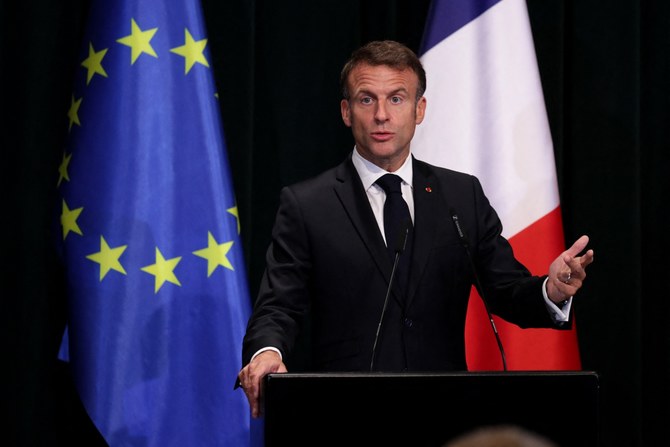
The deep hugs, pursed lips and concerned expressions have come to personify Emmanuel Macron’s visits to the Middle East. The embattled French president, who is presiding over a divided republic at home, has used his regional trips as an opportunity to grandstand on the international stage, at times as a figure of authority and at others the engaging face of the West.
From his engagement in the Middle East peace process to his support for peace talks in Ukraine, Macron has demonstrated a readiness to engage in geopolitical complexities and pursue diplomatic solutions. Last week, he visited Israel, the occupied West Bank and Egypt, leaving many perplexed about whether he genuinely thought he could succeed where others have so recently failed.
Having pursued professional and political interests far removed from the Middle East before his election as president, Macron began his first term with a state visit to Morocco. In the time since, he has continued to seek out opportunities to project power in the region, such as through his differences of opinion with Turkish President Recep Tayyip Erdogan, his proximity to Gulf leaders, his involvement in Lebanon and his cultivation of Iraq.
As he shuttled around the region’s affected capitals last week, Macron hoped to appear front and center in the Middle East once more. Going further than US President Joe Biden and UK Prime Minister Rishi Sunak, the French president sought to position himself as a Jacques Chirac, not a Francois Hollande, by directing the diplomacy of a country whose raucous issues too often prohibit her leaders from having a global impact.
Macron is directing the diplomacy of a country whose raucous issues too often prohibit her leaders from having a global impact
Zaid M. Belbagi
In a joint statement with Israeli Prime Minister Benjamin Netanyahu, Macron reiterated his support for Israel, while warning of the need to avoid civilian casualties and not lose track of a political solution. Keen to extend France’s traditional “friend of both” policy in regard to the conflict, he condemned Israeli settlements in the West Bank and East Jerusalem as being illegal. While being supportive of an independent Palestinian state, France officially considers Hamas as a terrorist organization and calls on it to renounce violence.
The president also found time to visit the Palestinian Authority in Ramallah before continuing on to regional capitals. The lack of fanfare surrounding his arrival was perhaps symptomatic of the lowering of France’s position in the region.
Relations between France and the Middle East are long-standing, with Paris having particularly close ties to the Levant. Having been closely involved in the modern history and politics of the Levantine states of Lebanon, Syria and Iraq, as well as Israel and the Occupied Territories, the current crisis offers Macron the opportunity to restate France’s historical credentials. His visit built upon the president’s long-standing involvement in Lebanese affairs, through which he has argued the importance of that country’s stability to the wider region and called for an overhaul of its political life and economic management.
France seeks a role greater than that of mediator. It wants to be a diplomatic leader in the region
Zaid M. Belbagi
Regarding Syria, on which Macron has been vocal in his opposition to the Assad regime, he came to power too late to have a lasting impact on the conflict. It is in Iraq, therefore, where he has sought to have influence. Macron’s Baghdad Summit was an attempt to solidify regional cooperation. Last week’s regional visit came amid uncertainty over the summit’s next meeting, which may be canceled in light of the current events in the Middle East.
Macron’s recent diplomatic activity in the Arab world, with a visit to the Gulf scheduled for later in the autumn, comes in the light of the sustained decline in France’s influence on the African continent. Macron has attracted criticism for presiding over France’s shrinking international role, making the presence of French companies like TotalEnergies in Iraq and Safran and Dassault in the Gulf particularly important to demonstrating his ability to pursue French interests.
Through diplomatic platforms such as the Baghdad Summit, increased economic ties and the soft power projection of cultural projects like the Louvre Abu Dhabi, the French presidential envoy to AlUla and the country’s enduring custodianship of certain Catholic sites in Jerusalem, France seeks a role greater than that of mediator. It wants to be a diplomatic leader in the region.
Macron will be president until 2027 but, bound by constitutional term limits, the 45-year-old will be mid-career when he steps down from one of the world’s most powerful jobs. His efforts to bolster Europe’s influence in international affairs and his responses to international crises — marked by his “no matter the cost” policy during the COVID-19 pandemic — in parallel to his involvement in conflict resolution and peace-building initiatives, stand out as preparation for a greater calling.
Zaid M. Belbagi is a political commentator and an adviser to private clients between London and the GCC. X: @Moulay_Zaid












